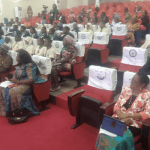The National Institute for Legislative and Democratic Studies, NILDS, says ensuring women’s meaningful representation is critical to building an inclusive and accountable security sector that reflects the diversity of the community it serves and better responds to their needs.
To this end, NILDS is collaborating with the National Assembly and Security Institutions on the need for gender responsive laws.
The nation’s security institutions are no doubt, major actors in the prevention and response to safety of lives and property in Nigeria.
While these security institutions strive to achieve their mandates every year, experts say huge gender gaps are visible in their policies and operational procedures at all levels, including enabling legislations.
This explains NILDS’ partnership with the parliament and security agencies towards strengthening gender-responsive security sector policy reforms and implementation of gender policies adopted by target security institutions.
The objectives of the Initiative includes; Increasing women’s effective participation in peace and security processes, peace negotiations, conflict prevention and resolution as well as improve public perception of the role of women in peace and security at all levels.
The challenge before the National Assembly is to commit to legislative reforms that reflect gender-responsiveness
The project is designed to respond to gaps identified in women’s representation in the security sector and the broader need for a gender responsive approach to security
operations.
NILDS says its end result is to enhance gender-based sensitive security sector and foster community dialogue between women affected by conflicts and security sector actors.
The National Institute for Legislative and Democratic Studies, NILDS, says ensuring women’s meaningful representation is critical to building an inclusive and accountable security sector that reflects the diversity of the community it serves and better responds to their needs.
To this end, NILDS is collaborating with the National Assembly and Security Institutions on the need for gender responsive laws.
The nation’s security institutions are no doubt, major actors in the prevention and response to safety of lives and property in Nigeria.
While these security institutions strive to achieve their mandates every year, experts say huge gender gaps are visible in their policies and operational procedures at all levels, including enabling legislations.
This explains NILDS’ partnership with the parliament and security agencies towards strengthening gender-responsive security sector policy reforms and implementation of gender policies adopted by target security institutions.
The objectives of the Initiative includes; Increasing women’s effective participation in peace and security processes, peace negotiations, conflict prevention and resolution as well as improve public perception of the role of women in peace and security at all levels.
The challenge before the National Assembly is to commit to legislative reforms that reflect gender-responsiveness
The project is designed to respond to gaps identified in women’s representation in the security sector and the broader need for a gender responsive approach to security
operations.
NILDS says its end result is to enhance gender-based sensitive security sector and foster community dialogue between women affected by conflicts and security sector actors.
The National Institute for Legislative and Democratic Studies, NILDS, says ensuring women’s meaningful representation is critical to building an inclusive and accountable security sector that reflects the diversity of the community it serves and better responds to their needs.
To this end, NILDS is collaborating with the National Assembly and Security Institutions on the need for gender responsive laws.
The nation’s security institutions are no doubt, major actors in the prevention and response to safety of lives and property in Nigeria.
While these security institutions strive to achieve their mandates every year, experts say huge gender gaps are visible in their policies and operational procedures at all levels, including enabling legislations.
This explains NILDS’ partnership with the parliament and security agencies towards strengthening gender-responsive security sector policy reforms and implementation of gender policies adopted by target security institutions.
The objectives of the Initiative includes; Increasing women’s effective participation in peace and security processes, peace negotiations, conflict prevention and resolution as well as improve public perception of the role of women in peace and security at all levels.
The challenge before the National Assembly is to commit to legislative reforms that reflect gender-responsiveness
The project is designed to respond to gaps identified in women’s representation in the security sector and the broader need for a gender responsive approach to security
operations.
NILDS says its end result is to enhance gender-based sensitive security sector and foster community dialogue between women affected by conflicts and security sector actors.
The National Institute for Legislative and Democratic Studies, NILDS, says ensuring women’s meaningful representation is critical to building an inclusive and accountable security sector that reflects the diversity of the community it serves and better responds to their needs.
To this end, NILDS is collaborating with the National Assembly and Security Institutions on the need for gender responsive laws.
The nation’s security institutions are no doubt, major actors in the prevention and response to safety of lives and property in Nigeria.
While these security institutions strive to achieve their mandates every year, experts say huge gender gaps are visible in their policies and operational procedures at all levels, including enabling legislations.
This explains NILDS’ partnership with the parliament and security agencies towards strengthening gender-responsive security sector policy reforms and implementation of gender policies adopted by target security institutions.
The objectives of the Initiative includes; Increasing women’s effective participation in peace and security processes, peace negotiations, conflict prevention and resolution as well as improve public perception of the role of women in peace and security at all levels.
The challenge before the National Assembly is to commit to legislative reforms that reflect gender-responsiveness
The project is designed to respond to gaps identified in women’s representation in the security sector and the broader need for a gender responsive approach to security
operations.
NILDS says its end result is to enhance gender-based sensitive security sector and foster community dialogue between women affected by conflicts and security sector actors.
The National Institute for Legislative and Democratic Studies, NILDS, says ensuring women’s meaningful representation is critical to building an inclusive and accountable security sector that reflects the diversity of the community it serves and better responds to their needs.
To this end, NILDS is collaborating with the National Assembly and Security Institutions on the need for gender responsive laws.
The nation’s security institutions are no doubt, major actors in the prevention and response to safety of lives and property in Nigeria.
While these security institutions strive to achieve their mandates every year, experts say huge gender gaps are visible in their policies and operational procedures at all levels, including enabling legislations.
This explains NILDS’ partnership with the parliament and security agencies towards strengthening gender-responsive security sector policy reforms and implementation of gender policies adopted by target security institutions.
The objectives of the Initiative includes; Increasing women’s effective participation in peace and security processes, peace negotiations, conflict prevention and resolution as well as improve public perception of the role of women in peace and security at all levels.
The challenge before the National Assembly is to commit to legislative reforms that reflect gender-responsiveness
The project is designed to respond to gaps identified in women’s representation in the security sector and the broader need for a gender responsive approach to security
operations.
NILDS says its end result is to enhance gender-based sensitive security sector and foster community dialogue between women affected by conflicts and security sector actors.
The National Institute for Legislative and Democratic Studies, NILDS, says ensuring women’s meaningful representation is critical to building an inclusive and accountable security sector that reflects the diversity of the community it serves and better responds to their needs.
To this end, NILDS is collaborating with the National Assembly and Security Institutions on the need for gender responsive laws.
The nation’s security institutions are no doubt, major actors in the prevention and response to safety of lives and property in Nigeria.
While these security institutions strive to achieve their mandates every year, experts say huge gender gaps are visible in their policies and operational procedures at all levels, including enabling legislations.
This explains NILDS’ partnership with the parliament and security agencies towards strengthening gender-responsive security sector policy reforms and implementation of gender policies adopted by target security institutions.
The objectives of the Initiative includes; Increasing women’s effective participation in peace and security processes, peace negotiations, conflict prevention and resolution as well as improve public perception of the role of women in peace and security at all levels.
The challenge before the National Assembly is to commit to legislative reforms that reflect gender-responsiveness
The project is designed to respond to gaps identified in women’s representation in the security sector and the broader need for a gender responsive approach to security
operations.
NILDS says its end result is to enhance gender-based sensitive security sector and foster community dialogue between women affected by conflicts and security sector actors.
The National Institute for Legislative and Democratic Studies, NILDS, says ensuring women’s meaningful representation is critical to building an inclusive and accountable security sector that reflects the diversity of the community it serves and better responds to their needs.
To this end, NILDS is collaborating with the National Assembly and Security Institutions on the need for gender responsive laws.
The nation’s security institutions are no doubt, major actors in the prevention and response to safety of lives and property in Nigeria.
While these security institutions strive to achieve their mandates every year, experts say huge gender gaps are visible in their policies and operational procedures at all levels, including enabling legislations.
This explains NILDS’ partnership with the parliament and security agencies towards strengthening gender-responsive security sector policy reforms and implementation of gender policies adopted by target security institutions.
The objectives of the Initiative includes; Increasing women’s effective participation in peace and security processes, peace negotiations, conflict prevention and resolution as well as improve public perception of the role of women in peace and security at all levels.
The challenge before the National Assembly is to commit to legislative reforms that reflect gender-responsiveness
The project is designed to respond to gaps identified in women’s representation in the security sector and the broader need for a gender responsive approach to security
operations.
NILDS says its end result is to enhance gender-based sensitive security sector and foster community dialogue between women affected by conflicts and security sector actors.
The National Institute for Legislative and Democratic Studies, NILDS, says ensuring women’s meaningful representation is critical to building an inclusive and accountable security sector that reflects the diversity of the community it serves and better responds to their needs.
To this end, NILDS is collaborating with the National Assembly and Security Institutions on the need for gender responsive laws.
The nation’s security institutions are no doubt, major actors in the prevention and response to safety of lives and property in Nigeria.
While these security institutions strive to achieve their mandates every year, experts say huge gender gaps are visible in their policies and operational procedures at all levels, including enabling legislations.
This explains NILDS’ partnership with the parliament and security agencies towards strengthening gender-responsive security sector policy reforms and implementation of gender policies adopted by target security institutions.
The objectives of the Initiative includes; Increasing women’s effective participation in peace and security processes, peace negotiations, conflict prevention and resolution as well as improve public perception of the role of women in peace and security at all levels.
The challenge before the National Assembly is to commit to legislative reforms that reflect gender-responsiveness
The project is designed to respond to gaps identified in women’s representation in the security sector and the broader need for a gender responsive approach to security
operations.
NILDS says its end result is to enhance gender-based sensitive security sector and foster community dialogue between women affected by conflicts and security sector actors.














